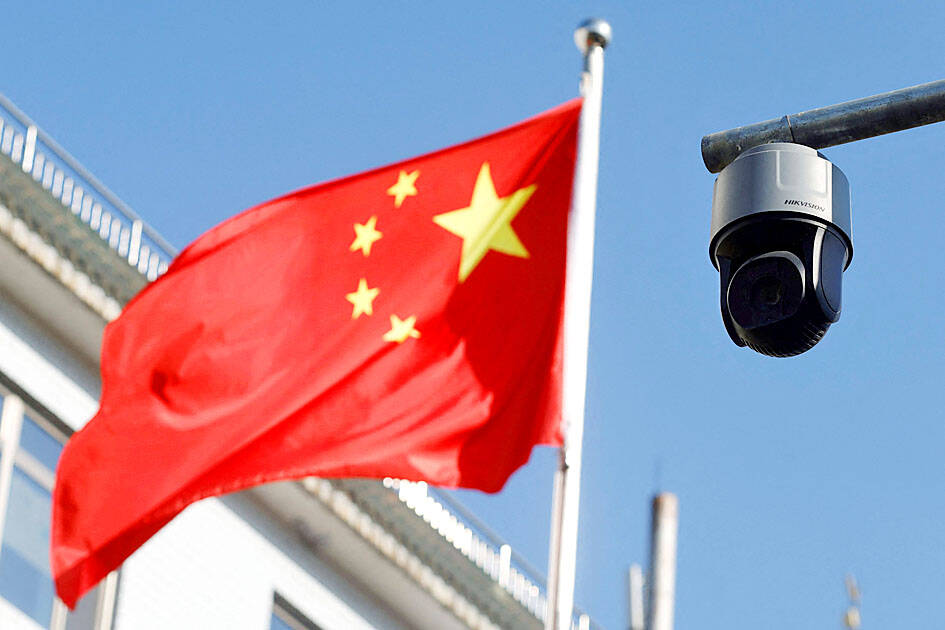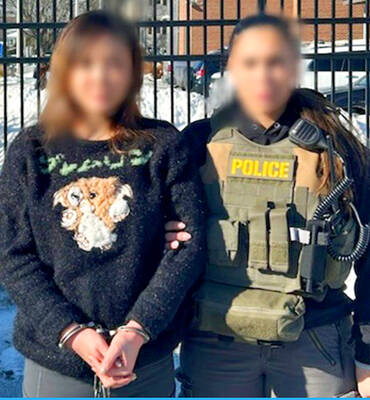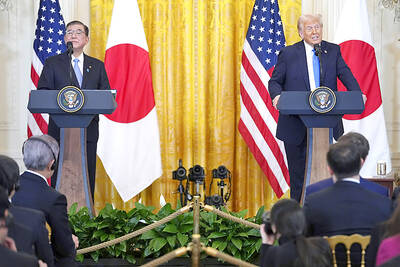China’s political warfare against Taiwan is this year to emphasize recruiting first-time Taiwanese visitors to study and work in China’s Fujian Province, an academic said yesterday.
The Fujian Provincial Government’s “united front” work plan for this year showed a special interest in absorbing young or politically inexperienced Taiwanese to achieve the annexation of Taiwan, said Cheng Cheng-ping (鄭政秉), a professor of finance at the National Yunlin University of Science and Technology.
Fujian is a bellwether for China’s political strategy to annex Taiwan, as Beijing deems the province the vanguard of “united front” work, Cheng said.

Photo: Reuters
China’s flagging economy might have partially informed the Fujian plan for Taiwanese to stimulate economic activity, industry and the labor market, he said.
Young Taiwanese might also have the knowledge and training Beijing needs to overcome a US technology embargo on semiconductors and equipment used in artificial intelligence products, he said.
However, the best evidence suggests that showcase economic zones for young Taiwanese have been an expensive failure for the province and its persistence in the projects likely reflects a political motive, he said.
The zones did not recruit Taiwanese with economically valuable skills, but drew discontented and dispossessed people, he added.
The Fujian plan states that the economic programs are in the service of China’s quest to “achieve the unification of the fatherland,” he cited the document as saying.
“China’s ultimate goal is to take over Taiwan, ideally without firing a shot,” Cheng said. “In the long term, China seems to be willing to spend a lot to get Taiwanese with low competitiveness to move there, even when its economy is weak.”
The emphasis on showing a curated version of China to common Taiwanese tourists and borough wardens, and courting residents of Kinmen and Lienchiang counties have been relatively successful, Cheng said.
The public should be more alert to China’s hostile intentions, he said.
The “united front” work plan published by the provincial government on Monday directed officials to broaden exchanges in education, law, health, technology, sports, cultural and hospitality sectors.
The plan called for increased flights between Taiwan and Fujian, encouraging young Taiwanese and first-time visitors to find jobs in the province and redoubling efforts to build economic integration demonstration zones.
It stipulated decreased restrictions for Taiwanese to invest in China, the establishment of special zones for start-ups and agriculture projects, and incorporating Kinmen and Lienchiang into Fujian’s economic sphere.
The province is use its cultural claim as the “ancestral land” to promote Taiwanese history as part of Fujian, Matsu veneration and other cultural exchanges, the plan said.

Johanne Liou (劉喬安), a Taiwanese woman who shot to unwanted fame during the Sunflower movement protests in 2014, was arrested in Boston last month amid US President Donald Trump’s crackdown on illegal immigrants, the Criminal Investigation Bureau (CIB) said yesterday. The arrest of Liou was first made public on the official Web site of US Immigration and Customs Enforcement (ICE) on Tuesday. ICE said Liou was apprehended for overstaying her visa. The Boston Field Office’s Enforcement and Removal Operations (ERO) had arrested Liou, a “fugitive, criminal alien wanted for embezzlement, fraud and drug crimes in Taiwan,” ICE said. Liou was taken into custody

The US-Japan joint statement released on Friday not mentioning the “one China” policy might be a sign that US President Donald Trump intends to decouple US-China relations from Taiwan, a Taiwanese academic said. Following Trump’s meeting with Japanese Prime Minister Shigeru Ishiba on Friday, the US and Japan issued a joint statement where they reaffirmed the importance of peace and stability in the Taiwan Strait and support for Taiwan’s meaningful participation in international organizations. Trump has not personally brought up the “one China” policy in more than a year, National Taiwan University Department of Political Science Associate Professor Chen Shih-min (陳世民)

‘NEVER!’ Taiwan FactCheck Center said it had only received donations from the Open Society Foundations, which supports nonprofits that promote democratic values Taiwan FactCheck Center (TFC) has never received any donation from the US Agency for International Development (USAID), a cofounder of the organization wrote on his Facebook page on Sunday. The Taipei-based organization was established in 2018 by Taiwan Media Watch Foundation and the Association of Quality Journalism to monitor and verify news and information accuracy. It was officially registered as a foundation in 2021. National Chung Cheng University communications professor Lo Shih-hung (羅世宏), a cofounder and chairman of TFC, was responding to online rumors that the TFC receives funding from the US government’s humanitarian assistance agency via the Open Society Foundations (OSF),

ANNUAL LIGHT SHOW: The lanterns are exhibited near Taoyuan’s high-speed rail station and around the Taoyuan Sports Park Station of the airport MRT line More than 400 lanterns are to be on display at the annual Taiwan Lantern Festival, which officially starts in Taoyuan today. The city is hosting the festival for the second time — the first time was in 2016. The Tourism Administration held a rehearsal of the festival last night. Chunghwa Telecom donated the main lantern of the festival to the Taoyuan City Government. The lanterns are exhibited in two main areas: near the high-speed rail (HSR) station in Taoyuan, which is at the A18 station of the Taoyuan Airport MRT, and around the Taoyuan Sports Park Station of the MRT